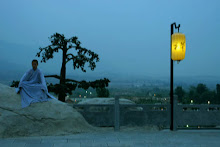
(Photo [and bite] by kou.)
__________
Whether you're in Guangzhou, Kashgard, or Harbin, Monday is the Mid-Autumn Festival (中秋节 zhongqiujie) or Moon Festival--a nationwide Chinese holiday. And while it's been celebrated for 3000 years, it didn't become an official vacation day until this year, when the Chinese government restructured days-off to alleviate the congestion caused by hordes of holidayers trying to visit relatives during the same time. In the former system, Chinese had three state-mandated holidays: the Chinese New Year, the first week of May, and the first week of October. It worked something like this: imagine all the citizens of Europe have the same two weeks off each year. Let's say the last two weeks of December. Imagine the entire population of France is flying to the Vatican while all the Italians have boarded trains to Germany. In the meantime the Spainards are sailing to France, and the Greeks have gathered for skiing in the Swiss Alps. And the Germans... well, you get the idea. The new system spreads those days off throughout the year--like this Monday. You should have the day off. If you don't, your boss is either breaking Chinese law or paying you triple "your normal pay rate," according to danwei. So while you're munching on mooncakes and watching reruns of "The Journey West," it might enhance your appreciation of the upcoming three day weekend to know one of the legends behind the Mid-Autumn Festival. Here's the bloodiest.
Legend has it--and many believe this one to be true--that the Mongols distaste for mooncakes led to their demise. Toward the end of the Mongol-ruled Yuan Dynasty, pestilence and disease devasted the population and the peasantry was beginning to resist the Yuan regime. Enter Zhu Yuanzhang. After a plague killed his parents, and years of begging as a Buddhist monk, Zhu joined the Red Turban Army. He rose through its ranks, becoming its undisputed leader, conquering much of Yuan-ruled China. The Mongols, however, maintained their stronghold of Nanjing. Zhu had to find a way to unite Nanjing's citizens, who were not allowed to assemble, without alerting the Mongols. According to legend, Zhu's advisor, Liu Bowen, suggested Zhu synchronize his attack on Nanjing with the celebration of the Mid-Autumn Festival. Liu received permission to honor the Mongols by distributing mooncakes as symbolic blessings for the longevity of the Yuan Dynasty. The tradition is to gift the mooncakes before the festival and eat them on the night of the brightest moon. The Mongols, of course, didn't eat local food so thousands of mooncakes were distributed to Han Chinese only. Inside each mooncake was a slip of paper that read: "八月十五殺韃子" ("Kill the Mongol Rulers on the 15th day of the Eighth moon"). (Some say these were the first fortune cookies.) On the night of the Mid-Autumn Festival, Zhu's rebels--with the help of Nanjing's citizens--successfully slayed the tyrannical Mongol rulers and established the Ming Dynasty. That was 653 years ago this Monday.
There are also legends of the Moon Lady and the Jade Rabbit (see link), but those are probably better enjoyed after imbibing barrels of baijiu or better yet--kumis. How do the Cantonese celebrate the Mid-Autumn Festival? Many attend the Lantern Festival at Culture Park (文化公园wenhuagongyuan; see map). I think it's this Sunday, the 14th, at least historically the festival's been held on the eve of the Mid-Autumn Festival. I'll post more details if I find them. Please comment below if you have any insight.
(Send a mooncake greeting card online.)
+copy.jpg)



No comments:
Post a Comment